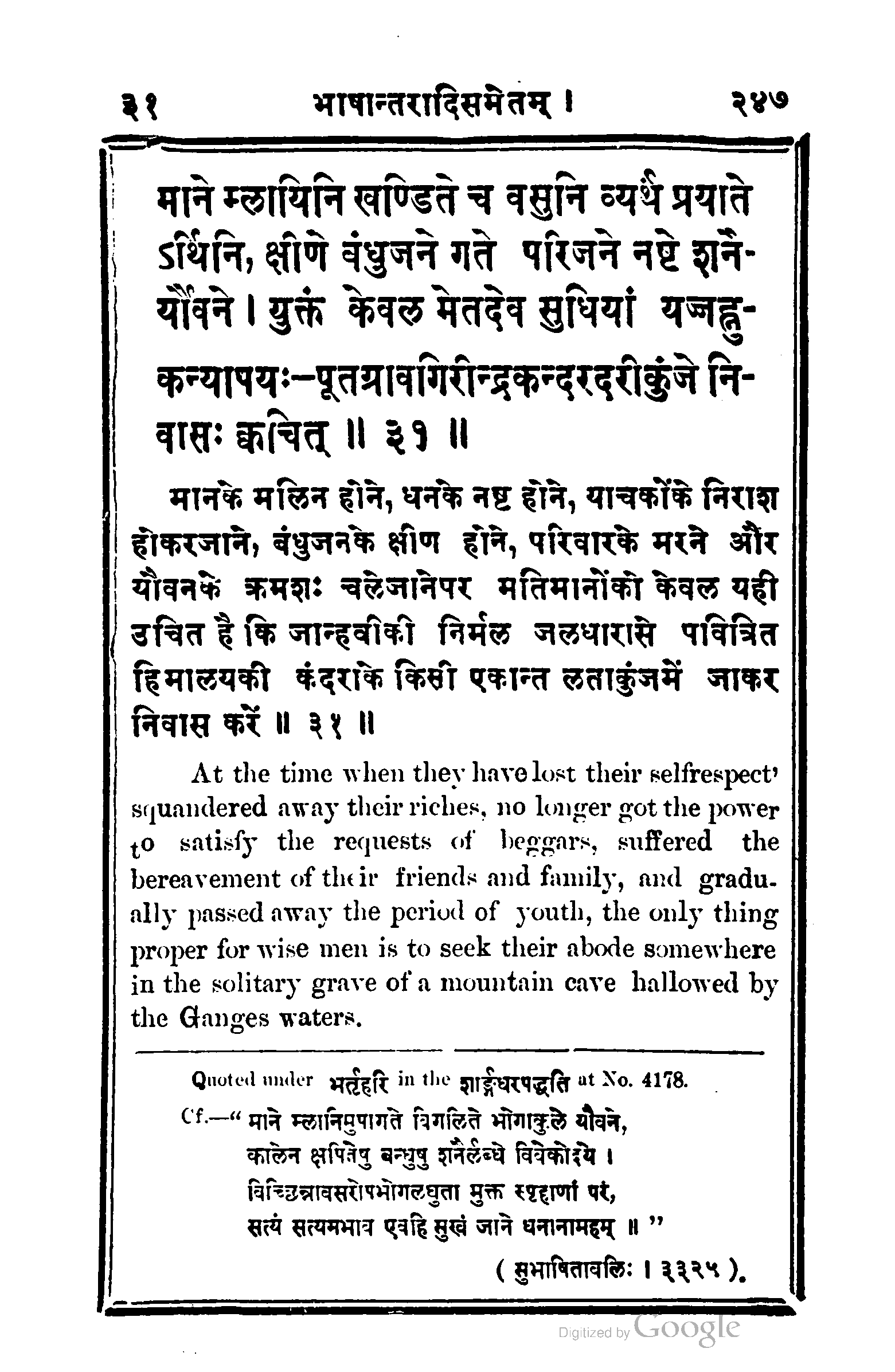Tawney
Mādhavānanda
Telang
verse

Text (not proofread)
माने म्लायिनि खण्डिते च वसुनि व्यर्थं प्रयातेर्थिनि
क्षीणे बन्धुजने गते परिजने नष्टे शनैर्यौवने ।
युक्तं केवलमेतदेव सुधियां यज्जलकन्यापयः
पूतग्रावगिरीन्द्रकन्दरदरीकुञ्जे निवासः क्वचित् ॥ ३३ ॥
footnote

Text (not proofread)
XXXIII . ( a ) म्ञायिनि ; म्लायति . A. वाघिनि . K. Bo . ( orig . Bo.n. ) मा
यिनिं . N. ° सुनि ; ° यसि . A. ०६ ; ° र्थम् A. B. P. M. R. Bo.n. ०. K.
Bo . N. ( d ) दरी ; तटी , N. नि ० ; ०. Bo.n.
endnote

Text (not proofread)
St. XXXIII.- € уà = sagañamäus g . ( Râmarshi ) de
stroyed or lost seems to be more likely . Twithout obtaining
anything . क्षोणे = नष्टवने ( Ramarshi ) कन्दरदरीकुञ्ज - - कन्दर and दरी are
given as synonymes in Amara and Medini . Perhaps therefore the
reading of N. ought to be preferred as avoiding the pleonasm . Râ
marshi renders by : which would mean a natural cave
( Amara . ) ; t by Jer which is the same thing ; and by
affar as in Amara ; and takes the whole to be a Samâhâra
Dvandva .-- S'árdúlavikridita .
Kosambi
verse

Text (not proofread)
माने म्लायिनि खण्डिते च वसुनि व्यर्थं प्रयातेऽर्थिनि
M
! क्षीणे बन्धुजने गते परिजने नष्टे शनैर्यौवने । ;
युक्तं केवलमेतदेव सुधियां यज् जह्रुकन्यापय :
पूतग्रावगिरीन्द्र कन्दरदरीकुञ्जे निवासः कचित् || ३०३ ॥
footnote

Text (not proofread)
303 { V } Om.in . W and GV82387 ( Probably missing folio in original ) .
. 4 ) A3 F2 माने म्लायति ; X 2 म्लाने मानिनि . F3 वसुमति ( for च वसुनि ) . C Ec J
Y1 . 2. 4–4 T G_M व्यथं ; IF 2 व्यर्थ - ( for व्यर्थं ) . Com .; G1 प्रयासे ( for प्रयाते ) . - 1 ) Ba
परजने ; Xs सखिजने ( for परिजने ) . B F 1 याते ; X भ्रष्टे ( for नष्टे ) . E 2 X 2 शनिर् ; Gat
पुनर् - ° ) 43 युक्ते ( for युक्तं ) . IF : सुधियो ; Y1 ( printed text ) सुधिया ; Y1G + विदुषां .
J1.3 या जहु 4 ) DF 1.3 - पूतग्राम - ; J3 पुत्रप्राव ; M1.5 पूरे वाथ ( for पूतग्राव - ) . Y 3
करींद्र- ( for -गिरीन्द्र ) . M1.5 मंदर - ( for -कन्दर ) . Y1 -कुटी- ; Y2 . 1 - 8T G1 M -तटी -3
G + - नटी- ( for -दरी - ) . F3.5 कुंजेषु वासः ; X कुक्षौ निवास :.
BIS . 4825 ( 2183 ) Bhartr ed . Bohl . 3. 79. Haeb 101 ; Galan 72 lith ed . II
31. Prasañgabh . 10. Subhash 312 ; Sp , 4178 ( Bh . ) ; SR.B. p . 376.254 ( Bh . ) ; SK
7. 114 ; SU . 1053 ; SSD . 4. f . 28a ; JSV . 304. 3 .

